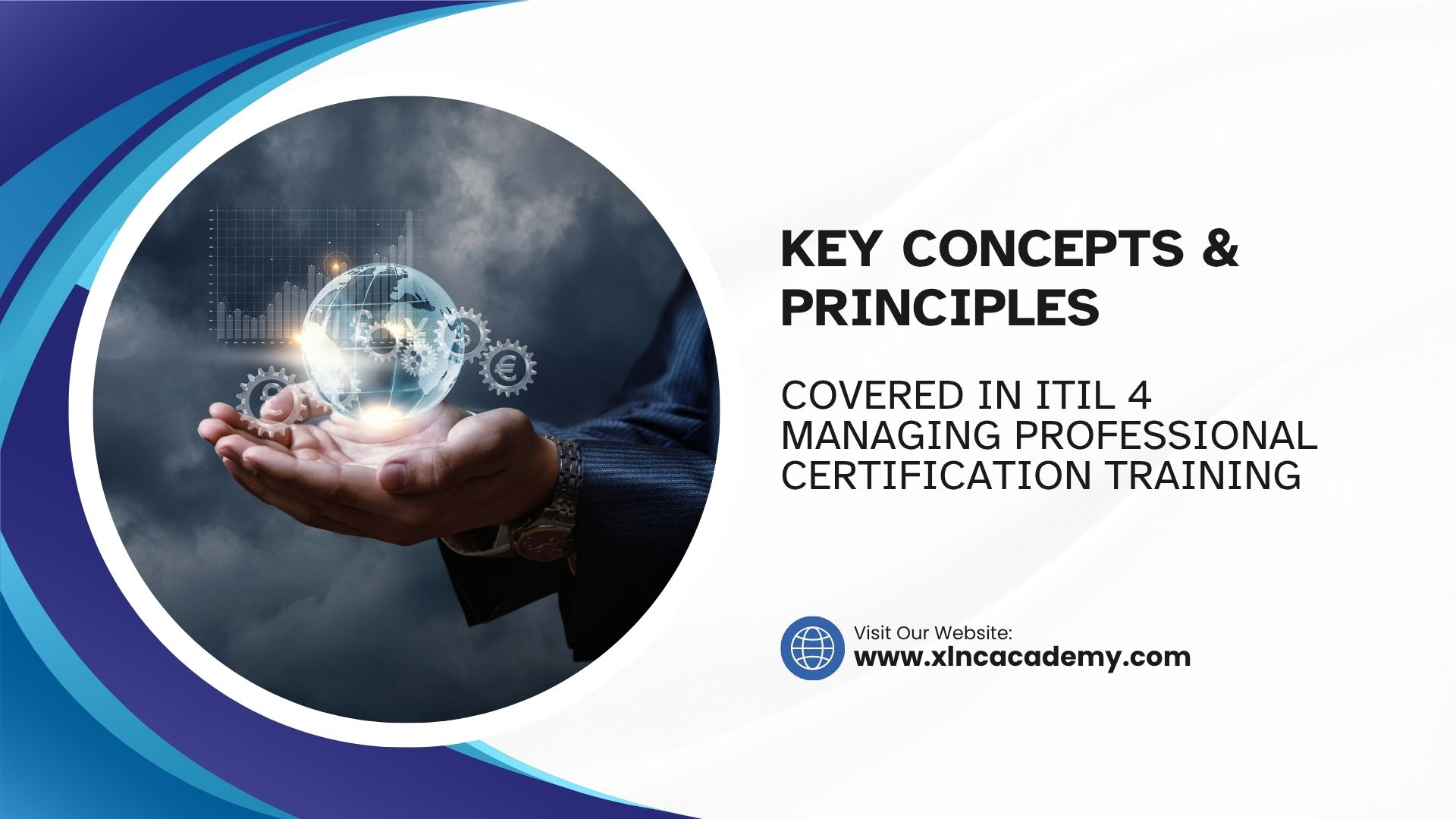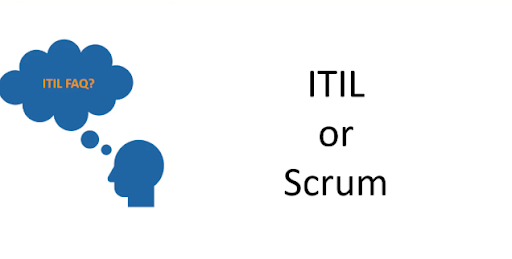Key Concepts And Principles Covered In Itil 4 Managing Professional Certification Training
Posted on on October 29, 2024 | by XLNC Team

The ITIL 4 Managing Professional Certification provides an enriched vision of ITSM. IT operations are expected to run at their best in today's high-speed business scenario. Organizations increasingly depend on digital services, so the professional needs to be equipped to manage and align IT operations toward business objectives and induce continuous improvements. ITIL 4 Managing Professional Certification trains individuals to do precisely that, educating them on the best practices, strategies, and frameworks on how to optimize their IT services. Read on to explore the core principles and essential concepts for ITIL 4 certification and why it could be a pivotal qualification for you. Before going deep into the ITIL 4 Managing Professional certification, let us know how the ITIL framework evolved. ITIL has been the global standard for IT service management since its development. This framework evolved with new demands from a changing world as digital transformation reshaped industries. ITIL 4 is the latest version: it includes agile practices and DevOps principles and emphasizes value creation for business. ITIL 4 Managing Professional Certification expands this into these best practices, giving professionals an integrated understanding of both operational stability and innovation ITSM. ITIL 4 Managing Professional comprises four core modules that help professionals gain advanced knowledge and skills to manage IT services properly in complex environments. This consists of four modules: Create, Deliver, and Support (CDS): A module that provides an end-to-end service delivery model. It considers every aspect, from designing services to managing them, including a lifetime of operations, for cost-effectiveness and quality service. Drive Stakeholder Value (DSV): This module is all about managing stakeholders effectively and spells out specific strategies for handling issues around user experience and expectations. It discusses how relationships between service providers and stakeholders can be established and developed. High-Velocity IT (HVIT): While digital services are growing at breakneck speeds, IT experts require methodologies that would allow them to deliver faster and more responsive services. HVIT discusses practices that are agile and lean management, as well as those based on DevOps, for high-velocity operations in IT. Direct, Plan, and Improve (DPI): Continuous improvement is always essential for any IT service provider. The DPI module prepares professionals to understand how to develop consistent improvements to IT services through strategic planning, governance, and ongoing analysis. The ITIL 4 Managing Professional certification introduces new foundational concepts for modern IT service management. Here's a breakdown of some of the most important ideas covered in the training: The Service Value System is the core of the ITIL 4 framework. It describes how value is produced by combining and working together all the different parts of an organization. It concentrates on transforming demand into value by introducing guiding principles, governance, continual improvement, and the service value chain. ITIL 4 Managing Professional Certification professionals learn how the SVS delivers flexible and holistic service values combined with business strategies. The ITIL 4 framework has replaced all those older versions' processes with 34 management practices. Incidents, responses, knowledge management, and others at the level of service desk management begin from here. In the certification courses, participants are made aware of how such practices blend together to bring the best quality service. The entire certification for ITIL 4 Managing Professional includes guiding businesses to utilize governance structures for managing IT services. They should cover aspects such as regulatory standards, internal policies, and procedures. DSV: As part of underlining the service value relationship, one of the significant modules teaches professionals to understand and manage customer expectations by which a service is either built or hopefully maintained successfully from the moment of contact and throughout the entire service lifecycle. Under all these things, ITIL 4 Managing Professional Certification trains you to develop strong relationships with customers and stakeholders. - Align services offered with customers' needs - Engage customers with multiple touchpoints to maximize satisfaction This module anchors customer-centricity as one of the critical skills for today's highly competitive information technology arena. The High-Velocity IT (HVIT) module enables professionals with tools and methodologies to manage IT services in cases of high technological variability. Today, being agile and quick is the prescription for success in business, leading to the rapid inductance of innovation and lack of delay in providing services. This module leans on and applies to agile practices and models of automation, DevOps, and continuous delivery. An ability to integrate these practices will make organizations responsive and flexible, yet most importantly, competitive. Professionals from this ITIL 4 Managing Professional certification will learn how to design high-performing IT environments that are adaptive to business needs. A lot of ITIL 4 focuses on the idea of continuous improvement. The Direct, Plan, and Improve (DPI) module allows organizations to assess their IT services continually and further them with incremental improvement. The DPI module in ITIL 4 Managing Professional certification training includes: Defining goals and objectives that align with business strategies Data and key performance indicators (KPIs) are used to evaluate success. Gradual movement for long-term success. Adhering to this principle allows professionals to ensure that the IT services managed by the organization stay relevant, effective, and worthwhile in the long term. Upon completion of ITIL 4 Managing Professional certification, several career benefits result for IT professionals: ITIL certifications are held in high esteem in the international arena; they give you the edge that relates to demonstrating your proficiency in handling innovation by modern IT services and enabling you to be valued for employment by any organization. ITIL 4 training enhances the value you can bring to employers who understand, with great depth, how to utilize IT services to achieve business objectives. This certification prepares IT professionals for leadership roles by equipping them with skills to align IT services with organizational strategy, manage stakeholders, and create value. The ITIL 4 Managing Professional certification is a mandatory qualification for professionals in IT planning to succeed in service management. This specific certification covers the principal topics, including the service value system, practices of ITIL, stakeholder management, and continual improvement to enable the profession to manage current IT services successfully. Whether you are an experienced IT professional seeking to advance your career or a manager tasked with running an IT group's operations, an ITIL 4 Managing Professional certification will prove a lot of investment in your future. Because businesses are on their path toward digital transformation, professionals acquiring ITIL 4 skills will be the moving force bringing value-driven, efficient, and scalable IT services forward.Knowing The ITIL Framework And Its Evolution
Core Modules Of Itil 4 Managing Professional Certification
Key Concepts For The ITIL 4 Managing Professional Certification
ITIL Practices And Governance
Driving Stakeholder Value: Core Focus Area
Moving With High-Velocity IT
Continual Improvement: A Key Principle
Benefits of ITIL 4 Managing Professional Certification to the IT Professional
Career Advancement Opportunities
Leadership Skills
Conclusion
Search
Latest Blogs
-
 Certified Ethical Hacker (CEH) Online Training Advance Your Cybersecurity Skills
Certified Ethical Hacker (CEH) Online Training Advance Your Cybersecurity Skills
-
 Which Scrum Master certification ASM, PSM or CSM
Which Scrum Master certification ASM, PSM or CSM
-
 Is Getting a Six Sigma Black Belt Worth It Pros ,Cons and Career Impact
Is Getting a Six Sigma Black Belt Worth It Pros ,Cons and Career Impact
-
 Generative AI Course 2025 for Software Developers and Engineers
Generative AI Course 2025 for Software Developers and Engineers
-
 Top Black Belt Certifications and Training for Quality Managers to Drive Organizational Excellence
Top Black Belt Certifications and Training for Quality Managers to Drive Organizational Excellence
-
 Data Science Syllabus and Subjects: What You Should Know Before Choosing a Course
Data Science Syllabus and Subjects: What You Should Know Before Choosing a Course
-
 What is the difference between ITIL and Scrum certifications
What is the difference between ITIL and Scrum certifications
-
 Six Sigma certification: The six-level path to Master Black Belt
Six Sigma certification: The six-level path to Master Black Belt


